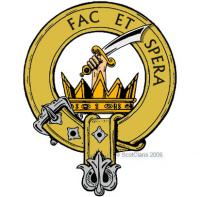
Clan Matheson
The name Matheson has been attributed to the gaelic 'Mic Mhathghamhuin' meaning 'son of the bear' or alternatively 'son of the heroes'. Traditionally, the clan descends from a twelfth century Gilleoin, who is thought to have been a scion of the ancient royal house of Lorne.
The Mathesons settled around Lochalsh, Lochcarron and Kintail and gave their allegiance to the MacDonalds as the Lords of the Isles. The Matheson clansmen fought for Donald, Lord of the Isles at the Battle of Harlaw. At that time, with a force of around 2000 men, the clan Matheson was considered as powerful as the more famous MacKenzies.
As the power of the Lords of the Isles waned, the Matheson clan found themselves squeezed between their powerful neighbours, the MacLeods of Lewis to the west, and the MacKenzies of the mainland to their east. They gave their allegiance to the MacKenzies, with Iain Dubh Matheson, the clan chief, dying in the defence of Eilean Donan Castle for the MacKenzies in 1539.
Not all the Mathesons were known for their warlike pursuits - Dougal mac Ruadhri Matheson established the name in both the organisation of church and state. He was Prior of Beauly from 1498 to 1514, and also sat in parliament when Ross was erected a separate sheriffdom.
Many Matheson families suffered great hardship in the Kildonan clearances. It is probably from these Sutherland evictions that Sir James Matheson left Scotland, and eventually founded his commercial empire, the well-known trading house of Jardine Matheson in the Far East.








